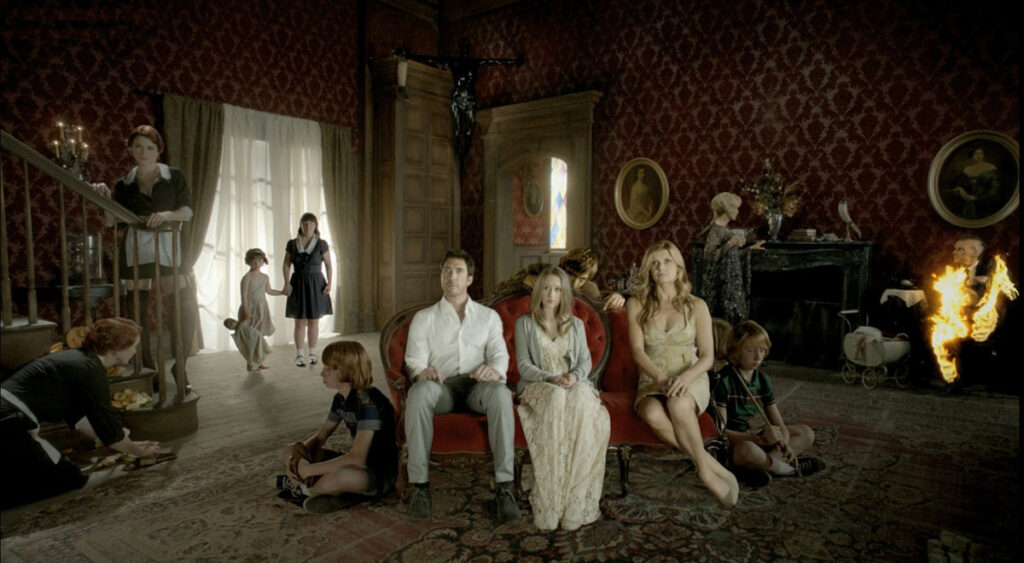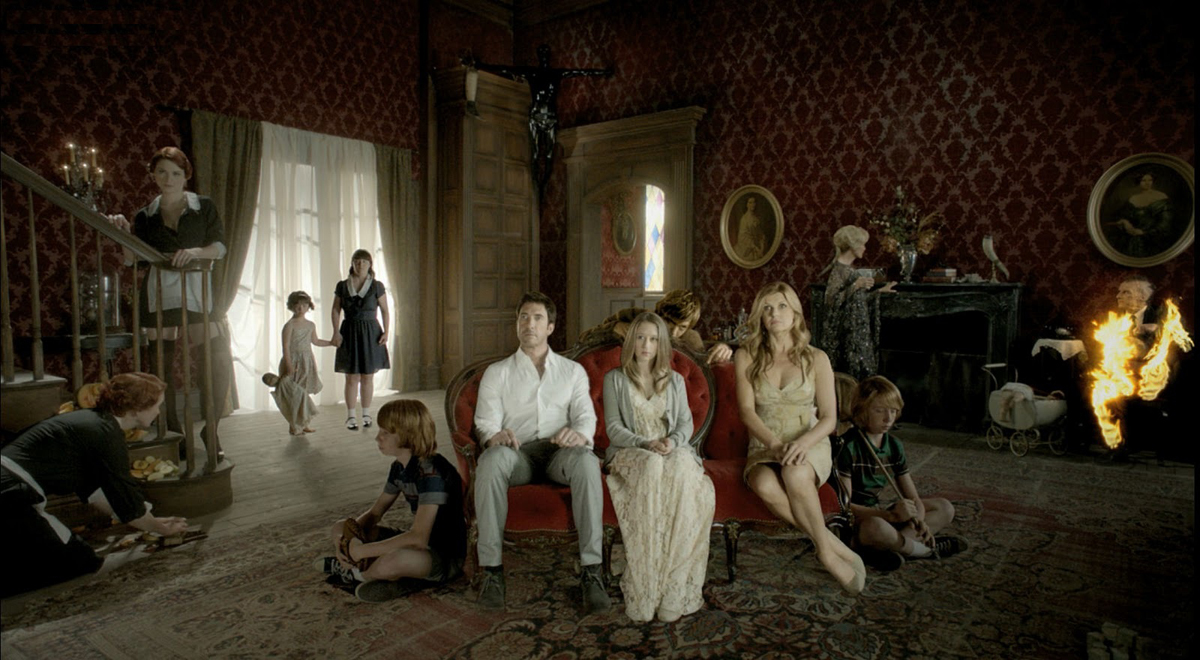
American Horror Story Season 1: The Enduring Legacy of Tate Langdon
The inaugural season of Ryan Murphy and Brad Falchuk’s anthology series, American Horror Story: Murder House, introduced audiences to a terrifying and captivating world of ghosts, trauma, and suburban horror. Among the many memorable characters, Tate Langdon, portrayed by Evan Peters, stands out as a complex and controversial figure. This article delves into the character of Tate Langdon, his impact on the season, and the lasting impression he has left on the American Horror Story franchise.
The Introduction of Tate Langdon
Tate Langdon is introduced as a troubled teenager and patient of Dr. Ben Harmon (Dylan McDermott). He quickly becomes involved with Violet Harmon (Taissa Farmiga), Ben’s daughter, forming a romantic relationship that is as disturbing as it is compelling. Initially presented as a sensitive and artistic soul, Tate’s true nature is gradually revealed, unveiling a dark and violent past. The complexities of Tate Langdon make him a fascinating character to analyze. His backstory is slowly revealed through flashbacks and therapy sessions, adding layers to his already multifaceted personality.
Tate’s Dark Past and Violent Acts
One of the most shocking revelations about Tate Langdon is his involvement in a school shooting. This event, depicted in a graphic and disturbing scene, casts a dark shadow over his character. The episode forces viewers to confront the reality of teenage violence and the potential consequences of mental health issues. Beyond the school shooting, Tate Langdon is also revealed to be responsible for other violent acts within the Murder House, including the rape of Violet’s mother, Vivien Harmon (Connie Britton). These actions contribute to the overall sense of dread and unease that permeates the season.
The Relationship Between Tate and Violet
Despite Tate Langdon’s horrific actions, his relationship with Violet is a central focus of the season. Their connection is built on shared feelings of isolation and a desire for understanding. Violet, initially unaware of Tate’s past, finds solace in his presence and believes in his capacity for change. Their relationship is a twisted and tragic love story, marked by moments of tenderness and profound betrayal. The dynamic between them raises difficult questions about forgiveness, redemption, and the nature of love in the face of unspeakable acts. The nuances of the Tate Langdon and Violet relationship are part of what made the show so memorable.
Tate Langdon as a Ghost in the Murder House
Like many of the characters in American Horror Story: Murder House, Tate Langdon is a ghost trapped within the confines of the property. His death, which occurred during a police raid following the school shooting, further complicates his character. As a ghost, he is forced to relive his past actions and confront the consequences of his choices. This eternal confinement adds another layer of tragedy to his story, highlighting the cyclical nature of violence and trauma. The Murder House itself acts as a prison, holding the spirits of those who died within its walls, forever bound to repeat their pasts. The presence of Tate Langdon contributes significantly to the house’s haunted atmosphere.
The Psychological Complexity of Tate Langdon
Tate Langdon is not simply a villain; he is a complex character grappling with deep-seated psychological issues. The show hints at a troubled childhood and a lack of proper mental health support. His actions, while inexcusable, are presented as a manifestation of his internal struggles. This exploration of mental health adds a layer of depth to the character, prompting viewers to consider the societal factors that contribute to violence and trauma. The series doesn’t shy away from portraying the harsh realities of mental illness and the devastating impact it can have on individuals and communities. Understanding the psychological dimensions of Tate Langdon is crucial to grasping his place in the narrative.
Controversy and Criticism Surrounding Tate Langdon
The character of Tate Langdon has been the subject of considerable controversy, particularly regarding the romanticization of a school shooter. Some critics argue that the show glorifies violence and minimizes the impact of Tate’s actions on his victims and their families. The romantic relationship between Tate and Violet has also been criticized for its problematic portrayal of a relationship built on trauma and abuse. These criticisms highlight the ethical challenges of depicting sensitive topics in entertainment and the importance of responsible storytelling. The debate surrounding Tate Langdon underscores the power of media to influence perceptions and shape societal attitudes.
Evan Peters’ Performance as Tate Langdon
Evan Peters’ portrayal of Tate Langdon is widely praised for its nuance and complexity. He manages to capture the character’s vulnerability and darkness, creating a compelling and unforgettable performance. Peters’ ability to convey Tate’s inner turmoil and conflicting emotions is a key factor in the character’s enduring appeal. His performance has solidified his status as a prominent actor within the American Horror Story franchise, with appearances in subsequent seasons in various roles. The success of Tate Langdon is inextricably linked to Peters’ exceptional acting skills.
The Lasting Impact of Tate Langdon on American Horror Story
Tate Langdon remains one of the most discussed and debated characters in the history of American Horror Story. His presence in Murder House set the tone for the series’ exploration of dark themes and complex characters. He exemplifies the show’s willingness to push boundaries and challenge viewers’ expectations. The character’s legacy extends beyond the first season, with references and callbacks to Tate Langdon appearing in later installments of the series. His impact on the franchise is undeniable, solidifying his place as a key figure in the American Horror Story universe. The complexities of the Tate Langdon character continue to resonate with audiences.
Analyzing Tate Langdon’s Motives
Understanding Tate Langdon‘s motives requires a deep dive into his past and psychological state. While his actions are reprehensible, exploring the factors that contributed to his behavior can offer insights into the complexities of human nature. His feelings of isolation, alienation, and anger, combined with a lack of adequate mental health support, likely played a significant role in his descent into violence. The series suggests that Tate Langdon was a product of his environment and a victim of societal failures. This analysis does not excuse his actions, but it provides a framework for understanding the underlying causes of his behavior.
Tate Langdon and the Theme of Redemption
The question of whether Tate Langdon is capable of redemption is a central theme of American Horror Story: Murder House. While he expresses remorse for his actions, the magnitude of his crimes makes forgiveness difficult to contemplate. The series leaves the question of his redemption open-ended, allowing viewers to draw their own conclusions. Some argue that his eternal confinement in the Murder House is a form of punishment, while others believe that he is capable of growth and change. The debate surrounding Tate’s potential for redemption highlights the complexities of morality and the enduring power of hope. The very nature of Tate Langdon‘s existence challenges the concept of simple categorization of good and evil.
The Influence of Tate Langdon on Subsequent AHS Seasons
While Tate Langdon only appeared in the first season, his influence can be felt throughout the American Horror Story franchise. The series has continued to explore themes of violence, trauma, and mental health, often featuring characters with similar complexities and moral ambiguities. The success of Tate Langdon paved the way for the creation of other memorable and controversial characters, solidifying the show’s reputation for pushing boundaries and challenging viewers. The enduring popularity of Tate Langdon demonstrates the lasting impact of Murder House on the overall trajectory of the series. [See also: American Horror Story Season 10 Double Feature Explained]
Conclusion: The Enduring Fascination with Tate Langdon
Tate Langdon is a character who evokes strong reactions, both positive and negative. His complexities, combined with Evan Peters’ compelling performance, have made him a lasting figure in the American Horror Story universe. Whether viewers sympathize with him or condemn his actions, there is no denying his impact on the series and the broader landscape of horror television. The enduring fascination with Tate Langdon speaks to the show’s ability to explore dark and challenging themes in a way that resonates with audiences. He remains a touchstone for discussions about morality, trauma, and the potential for redemption, ensuring his place in the annals of television history. He is arguably one of the most compelling characters in the entire run of American Horror Story, and the legacy of Tate Langdon continues to spark debate and captivate audiences years after his debut.

